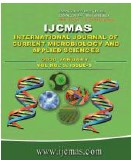


 National Academy of Agricultural Sciences (NAAS)
National Academy of Agricultural Sciences (NAAS)

|
PRINT ISSN : 2319-7692
Online ISSN : 2319-7706 Issues : 12 per year Publisher : Excellent Publishers Email : editorijcmas@gmail.com / submit@ijcmas.com Editor-in-chief: Dr.M.Prakash Index Copernicus ICV 2018: 95.39 NAAS RATING 2020: 5.38 |
Mushrooms, also called as ‘white vegetables’ or ‘boneless vegetarian meat’ contain ample amount of proteins (20-35%), vitamins and fibre. Milky mushroom is robust, fleshy, milky white, umbrella like mushroom, having long shelf-life and lucrative market value. Ballari District lies in Northern dry zone of Karnataka receive 28-290 C mean temperature in January and highest maximum temperature in May reaches 430C. Hence, different mushroom species can be cultivated due to prevailing wide range of temperature in the District. Paddy/rice is the major crop grown in Ballari district (75,000 Ha) under Tungabhadra irrigation command area and plenty of paddy straw is available to grow mushrooms which is either wasted or burnt by the farmers. Realising the scope for tropical mushrooms like oyster (Pleurotus spp.) and milky mushroom (Calocybeindica) in the District, trainings have been given to the interested farmers, farm women and rural youths at ICAR-Krishi Vigyan Kendra, Hagari, which in turn increased their knowledge level and has created a favourable attitude. A complete list of 250 respondents was randomly prepared who have undergone through training and demonstration on mushroom production technique from 2016 to 2019. It was observed that pre-training knowledge score was not much satisfactory, however, the knowledge score gained after training was more satisfactory in all the aspects. The exposure to training had increased the knowledge of trainees regarding techniques of mushroom production. The reason behind the satisfactory change in perception level might be due to keen interest of participants and methods followed for technology transfer to the trainees. Some trainees adopted mushroom cultivation as self-employment and set up their own units. Few mushroom entrepreneurs have also extended their mushroom production to Value added products like mushroom pickles and dehydrated mushrooms. The study revealed that the mushroom production training has created a favourable attitude among the trainees and also enhanced the economic level of beneficiaries who adopted it as a source of livelihood.
 |
 |
 |
 |
 |